Favorite Books of 2020
It’s been a weird year, much more stressful than usual. I read a fair amount of fiction and sci-fi, often as a way to decompress and escape a bit from the world.
Every one of the books in this post is exceptional. They’re the best of the best, the books that I gave 5-star ratings to over the last year on Goodreads. My criteria is: “Deeply influential book, changed my worldview”.
Bloodchild and Other Stories, by Octavia Butler
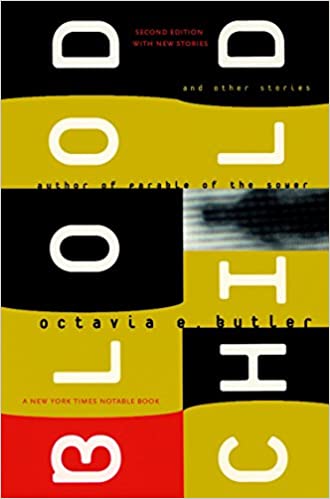
What the fuck did I just read!?
… was how I felt after reading Bloodchild. It was so unexpectedly creepy and weird I immediately went back and read it again. It was even better the second time.
I enjoyed all of the other short stories in the book. Particularly The Evening and the Morning and the Night, and Speech Sounds.
The two essays are amazing!! Positive Obsession was great for understanding Octavia’s background. Furor Scribendi is wonderfully inspiring. They offer fantastic advice not just for writers but anyone on how to approach work with passion and consistency.
Parable of the Talents, by Octavia Butler
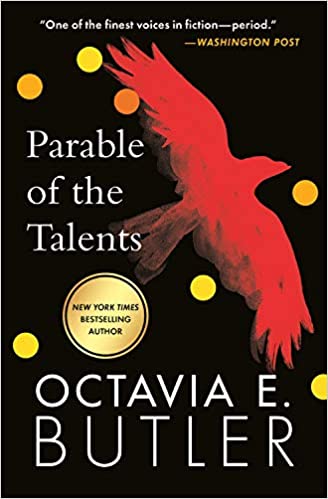
Parable of the Talents, the sequel to Parable of the Sower, is a survivalist story set in a dystopian 2035 where the US is governed by authoritarian Christian fundamentalists. Running wild and unrestrained the fundamentalists enslave portions of the population in order to “reform” them.
This is a frightening, detailed, gritty portrayal of a dark future, touching on themes of politics and manipulation of the public, at times hitting eerily close to home with fears of where we go from here in he USA after 2020.
I love Butler’s imagination. Her writing feels so unfiltered—like she doesn’t leave any dark thoughts out, regardless of how uncomfortable they might make the reader feel. It’s a fantastic story, painting a vicious future world, with a protagonist that gives you just enough hope and strength to get through it.
Make Time, by Jake Knapp and John Zeratsky
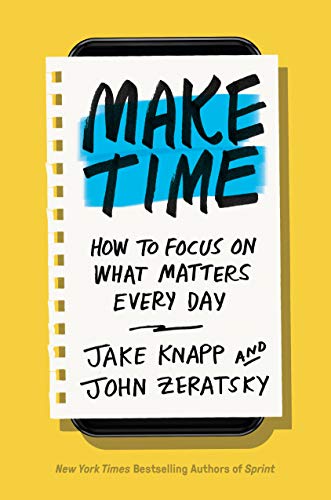
Make Time is the best personal productivity book I’ve read. It’s done more to change my habits and attitude towards my productivity than any other book. 2nd place being the seminal Getting Things Done.
This book is 5 stars for a number of reasons… The authors are relatable. The examples are realistic, not idealistic. The tips are designed to be inclusive of priorities like family, passions, and natural oscillations in energy level. It’s a light read, with the authors bringing a chill vibe, and a light touch to do things a little better, not shoot for perfection.
The biggest tactic in the book is the “highlight”. One 30–90 minute task that you decide to get done today that’ll make you happy with the result of the day. Alongside the highlight concept, there are loads short, snack-able tips, designed to be experimented with—kept or discarded. I loved the chapters on energy levels.
The Five Invitations, by Frank Ostaseski
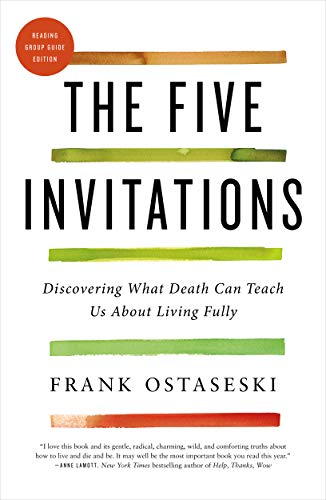
On the surface, The Five Invitations is a book describing how to support those who are grieving or dying, and how to grieve yourself. As a hospice founder, Frank Ostaseski sat with over 1000 people as they died, and supported thousands more loved ones in grieving. He tells many stories of those who have died, their feelings, what the process looked like, and lends his experience and wisdom on how to best approach these situations. There’s no secret or formula, as individuals and circumstances are so different. He gets exceptionally detailed with the examples; no nuance is missed. I learned a LOT of practical skills here for supporting people.
Under the surface, The Five Invitations delivers a huge amount more value. Frank himself is an inspiration. His patience, kindness, and intellect are remarkable. As you progress through the book he gradually reveals a number of horrific experiences he went through in his own life, and how he dealt with them. Some of the thought processes he developed around forgiveness, compassion and letting go of anger were, for me at least, world-view changing. e.g. it being in your self-interest to forgive, to release the mental burden.
This book isn’t just about death and grieving, it’s about how to be present, supportive and loving in any challenging life event for someone. It’s about how to approach adversity, and how to mentally and emotionally process extremely difficult events. It’s about how to live your life with impermanence in mind—knowing that you will die in the future, as will all of your loved ones.
Frank’s approach is rooted in Buddhism, quoting Pema Chodron, Thich Nhat Hanh The Dali Llama and other Buddhist teachers throughout the book. One of the things I love most about The Five Invitations is that it’s filled with detailed, real-life, applied examples of Buddhist concepts. The examples in typical Buddhist books aren’t nearly as gritty and real-life as those in The Five Invitations. Frank isn’t perfect, he’s doing the best he can, and I found the journey of his own improvement in supporting himself and others to be authentic and remarkable. This book pairs wonderfully with Bhuddist writing on impermanence, e.g. from Pema Chodron or Thich Nhat Hanh.
Don’t Bite the Hook, by Pema Chödrön
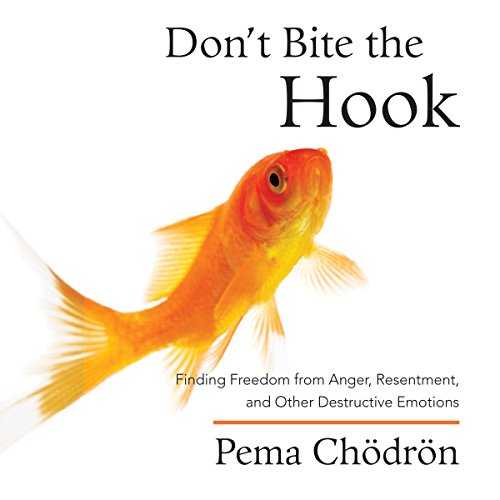
3 hours of focused, concise, and powerful lessons.
TL;DR: Over time you’ve built up habits of being irritated or frustrated by certain triggers. Some of these are minor irritations, some are bigger and may be negatively affecting your own mental peace and relationships with loved ones. This book helps you to observe and question how you react to your triggers, in order to potentially change your perception and response to better align with your goals. This book explains that it’s your own inner dialogue that’s causing most of the pain, and gives suggestions for how to validate that and fix it.
Pema Chödrön’s personality made this teaching enjoyable. She was direct, funny, and relatable. I appreciated all of the personal examples, poking fun at people, and cursing (unexpected from a Buddhist nun, and made it all the more delightful).
Highly recommended if, like me, you’re interested in working on being more patient and less irritable. A timely read as while I was stuck in my NYC apartment 24/7 with my family during the COVID lockdown :)
East of Eden, by John Steinbeck
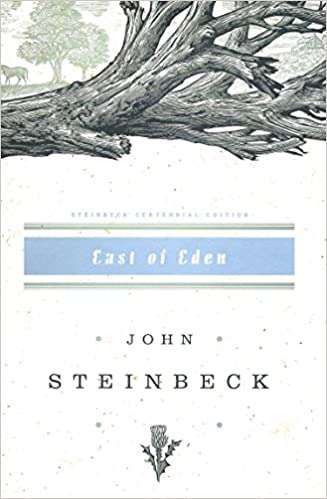
East of Eden is the best novel I’ve read. A story of families, primarily two brothers going through a number of difficult personal challenges.
From Wikipedia: “The book explores themes of depravity, beneficence, love, the struggle for acceptance and greatness, the capacity for self-destruction, and of guilt and freedom. It ties these themes together with references to and many parallels with the biblical Book of Genesis (especially Genesis Chapter 4, the story of Cain and Abel).”
It’s touching, shocking, and the story is perfectly told. It’s hard to think of a better character than Cathy in any book. Steinbeck paints characters and places so incredibly deeply, it’s like you’re in the story.

Buttigieg dives into why trust is so important across many different contexts: democracy, voting systems, COVID, climate change, and society in general.
Great examples, great data points, pro-active suggestions for solutions, and super well written.
A hyper-relevant read right now during COVID, and while trust in the US election system is under attack.
I was pleasantly surprised at the high quality of this given how fast it was written and published.
Maus I & II, by Art Spiegelman
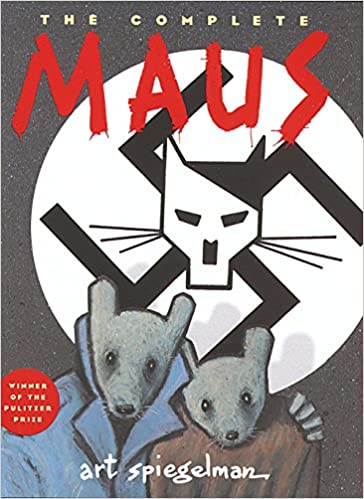
The Maus graphic novels really blew me away. Authentic, touching, and absorbing from beginning to end.
Two streams alternate back-and-forth throughout: Art’s discussions in NYC with his increasingly demanding, quirky, aging father who’s problems Art struggles to accept, and tales from his father’s time enduring Nazi occupation in Poland and Germany.
Both streams are completely engrossing. The pacing and interplay are wonderful. Art and his father were both relatable, with their flaws and challenges laid remarkably bare and honestly explored.
We Got Steam Heat, by Dan Holohan
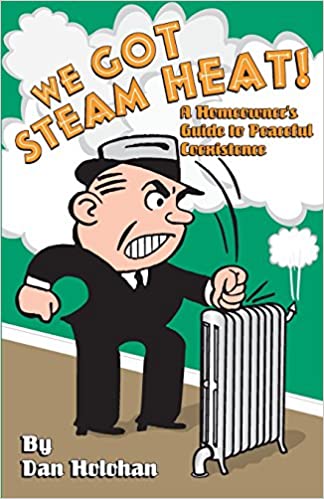
This year, we moved into a 100 year-old house with steam heating. Initially, we knew nothing about how it worked. This book has been a godsend in helping us understand steam heating systems, maintenance and common problems. Turns out steam heating is pretty great.
What sets this book apart is that Dan Holohan is an absolute legend. He has great stories to tell from architecting the design and installation of vast numbers of steam heating systems in NYC buildings back when it first came into usage.
It’s fun to learn about something completely new, and Dan is an incredible, humorous teacher, in a quirky Dad jokey kind of way. Watch any of his videos on YouTube for 5 mins and you’ll get the idea.
Surely You’re Joking Mr. Feynman, by Richard Feynman

Such a fun, inspiring read. Lots of stories from Feynman’s life, with particularly insightful stories on learning. He has a strong bias towards applied science, understanding the fundamentals, and learning with real world experimentation.
It’s a really fun read from beginning to end, with chapters jumping around lots of different areas of his life. I loved the safecracking chapters, and those on his time consulting on education systems in Brazil. I could have done without the quite out of place tales on picking up women, but I guess he wanted to put his whole self out there.
Super interesting guy—very stubborn and pragmatic, with strong principles.
The Black Swan, by Nassim Taleb

The Black Swan is a book about prediction, describing our many challenges and failings making predictions. It is probability and economics heavy, with examples often focusing on socioeconomic factors.
Black Swans are unknown unknowns; unforeseen positive or negative events that typically sit outside of the expectations of common predictions (as there was no reasonable way to predict them).
It was surprising to me that the 2009 financial crash and global COVID-19 pandemic are NOT categorized as black swans—they’re categorized as gray swans due to the occurrence of them being predictable (just not the exact timing, scale, or specifics).
There were so many highlights for me it’s hard to pick out key points. The entire book was fantastic, including the big essay at the end of the book (the second edition of the book).
Taleb is great at explaining his theories. He uses multiple examples to illustrate each one, and each of them tend to be pretty interesting.
I love books that describe and illustrate different worldviews and The Black Swan delivered strongly there.
Fair warning: Taleb can be quite rude and egotistical at times.
Thinking in Systems, by Donella Meadows
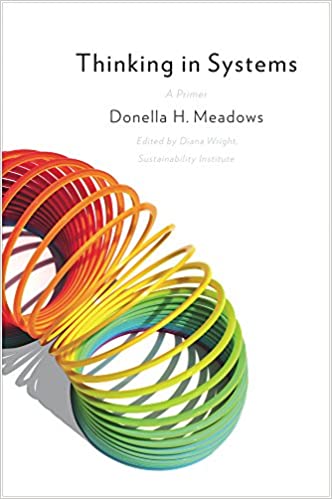
Thinking in Systems takes a LONG time to get going and deliver its value. All of the super insightful content is buried behind a LOT of lead-up.
The first half of the book is 3 stars. It dives into the fundamentals of systems thinking, describing numerous commonly found systems in detail. It’s more of a reference and primer to set up the terminology and concepts for the second half of the book.
The second half of the book is 5 stars. It broadly describes how and why massive complex real-world systems operate the way they do. It uses lots of real world examples from politics, economics, the environment, etc to explain common patterns, traps, and thoughts for remedies.
Best sections: Resiliency, bounded rationality, systems traps and opportunities, leverage points—places to intervene in a system, living in a world of systems.
It’s worth considering reading these sections first, or jumping forward to them when the first half of the book gets tiring. The appendix is really useful, serving as an index to each of the best sections. The structure of this book is strange and suboptimal, it’s better to read the book backwards.
I’m thankful that the editor was able to pick up the manuscript and drive this book to completion after Donella’s unexpected death. Donella shared such an incredible, experienced, caring worldview.
Stories of Your Life and Others, by Ted Chiang
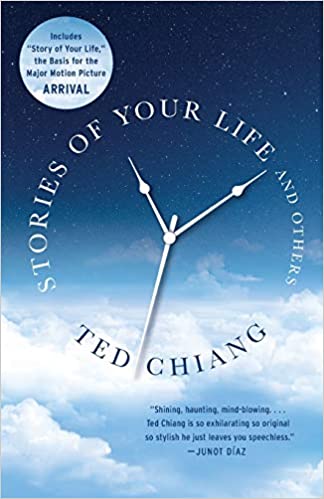
I enjoyed all of the novellas in this collection. Stories of Your Life (the title story) and Towers of Babylon were exceptional. Both spellbinding must reads.
Stories of Your Life is the story that the movie Arrival was based on. It bounces between 2 narratives: one of deciphering an alien language and one of interactions with the protagonist’s young daughter. I found it to be captivating and brilliantly executed.
I can’t wait for more Ted Chiang stories to read! The creativity, variety and quality of his work is really inspiring. His other book, Exhalation, was great as well.
The Pocket Thich Nhat Hanh, by Thich Nhat Hanh
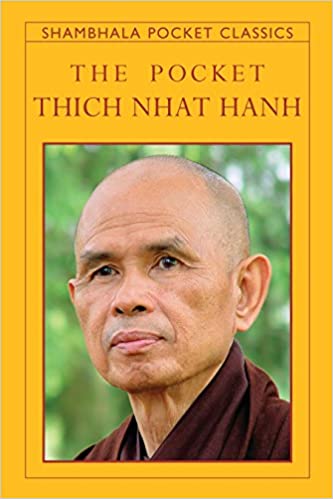
For me, Thich Nhat Hanh writes about Zen Buddhism perfectly. In this book he uses precisely the right words, with precisely the right tone, with just the right balance of connecting with the practicalities of modern western life.
I’ve been looking for a concise, powerful, and snackable book on mindfulness applied to everyday life to revisit frequently. This hits that need. It’s split in to small segments, each one takes roughly 2 minutes to read and addresses a specific point. Segments are grouped together into sections of similar content. Perfect for dipping into for 5 mins.
The back of the book references which of his books each of the segments came from, making this book a great jumping off point to more of his writing.
I highlighted roughly half of the passages in the book on Kindle, which is nuts. My favorite sections: the initial, basic section on Mindfulness, and the section on Emotions and Relationships.

This book is like the movie Inside Job, but for world poverty. It left me feeling angry and helpless to fix any of the problems, much like watching the Inside Job did.
It’s a bleak look at the capability of humans to exploit one another on a mass scale and the systems in place to mask and obscure the exploitation, in many cases twisting it into positive PR.
I learned a lot about world economics, the IMF, world bank, and trade deals like NAFTA.
The author suggests solutions to world poverty and the systematic exploitation of developing countries, but these solutions are not even remotely realistic. The aggressive capitalist system that’s doing the exploiting has no incentive to change, even in the face of a huge social uprising. It has huge incentives to push even harder on exploitation, especially on developing countries where it can exploit remotely, from a distance, with debt and tariffs. With the current systems in place, those living in poverty in developing countries will sadly keep getting fucked over.
I’m looking forward to Jason Hickel’s next book this year.
Team of Teams, by Stanley McChrystal
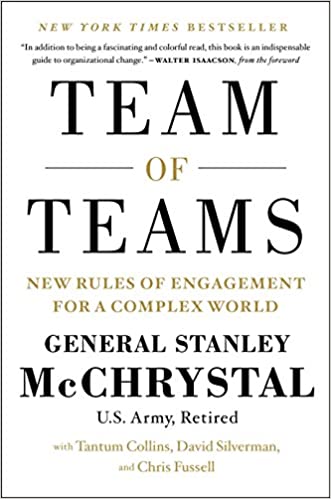
This book is about how to enable huge, complex teams to be adaptable at scale.
It deep dives into 2 main strategies:
- Creating shared consciousnesses so that folks at the front lines have a very high level of information and context.
- Delegating decision making so that senior leadership don’t bottleneck, increasing speed, adaptability, and empowerment.
There’s lot of fantastic, well placed anecdotes from the fight in Iraq, US companies, NASA, historical books, and the author’s personal life.
It takes a bit to get going but warms up by chapter 6 on org structures, which is fantastic. I loved chapter 8 on the O&I meeting structure, and chapter 11 on a leader’s role on a team of teams.
It’s not immediately drag-and-drop applicable to software teams, but that’s also what’s so interesting about this book, as the tactics used in a different context (the war against Al Qaeda) spur thought on what methods you could apply to software teams and how you might adapt them. The strategies are generalized enough to last a long time.
This is the best book on empowerment at scale that I’ve read yet.
We Were Eight Years in Power, by Ta-Nehisi Coates
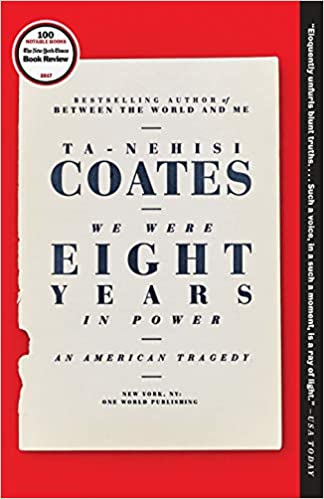
Last book, and one of the best.
Phenomenal on multiple levels:
- I learned a ton. Ta-Nehisi combines shocking, brutal, harrowing storytelling with incredibly well researched data and explanations of systems of discrimination.
- He comes across as deeply passionate, highly knowledgeable, direct, sensitive, introspective and driven. His attitude is an inspiring example of someone committed to passionate, powerful work.
- The writing in this book is sublime. It’s clear that he’s invested a lot of effort researching and honing his writing style, influenced by rap and poetry. There are some breathtaking chapter ending sentences, with words carefully selected to hit home powerfully.
- Surprisingly, the abnormal structure of this book worked really well. There are 8 long-form articles (I think one per year that he wrote for The Atlantic?) deep diving into topics like Reparations, and President Obama. Each article is prefaced with ~10 pages where he gives a quite personal feeling retrospective on where his life was at when he wrote the article, and additional context around it. It provided a nice rhythm and contrast between the carefully written articles and the more personal tone of the retrospectives. The structure broke the book up nicely into chunks, too.
The topics of the articles were super interesting and content was fantastic.
The paperback copy of this book is really cool. Very high production quality, lovely feel, and it’s set in a beautiful typeface—the fancy “Qu” is cool!
A few more books that I really enjoyed, the best of the books that I rated 4 stars:
- The Psychology of Money by Morgan Housel
- Live Your Truth by Kamal Ravikant
- Travels With Charley by John Steinbeck
- Of Mice and Men by John Steinbeck
- World War Z by Max Brooks
- Ender’s Game by Orson Scott Card
- The Old Man and the Sea by Ernest Hemingway
- This Is Water by David Foster Wallace
- Harrison Bergeron by Kurt Vonnegut Jr.
- So You Want to Talk About Race by Ijeoma Olou
- Becoming by Michelle Obama
- A Clockwork Orange by Anthony Burgess
… and those were the best books of 2020 for me! Hope you found one or two books that interest you.
Everything else that I read in 2020 is here: Goodreads 2020 year in books, and my favs from last year are here: Favorite Books of 2019.